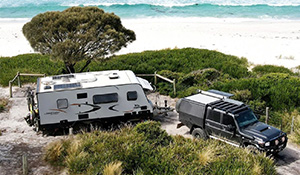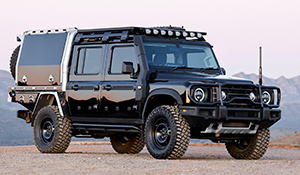ROAD TEST – 2023 Mercedes Benz GLE 400d
Words: Courtesy of practicalmotoring.com.au
Photos: Mercedes-Benz Australia and Practical Motoring
The Mercedes-Benz GLE can trace its history back to 1997 when the original M-Class made its debut, and at the time Mercedes had even considered it as a replacement for the G-Class, which would have missed the point entirely. The GLE name was introduced almost ten years later, replacing the ML badge.

Nowadays, the GLE sits between the GLC and GLS as a size-perfect option for small to large families.
As I have two young boys – one in primary school and the other an ambitious toddler – I slot neatly into the ‘small family’ niche, so the option to long-term test this seven-seater is ideal and not just because of its flexible interior space (all the seats can slide for changing legroom, and the third-row seats pop in and out quickly).

As it happens, I’m on the move, heading away from Melbourne suburbia into the country, specifically Gippsland in Victoria’s east. Fortunately, this 400d comes with a tow kit and a torquey yet frugal 2.9-litre turbo-diesel inline six-cylinder engine. It’s mated to a nine-speed automatic transmission that sends 700Nm of torque and 243kW of power to all four wheels via the Mercedes 4MATIC all-wheel drive system. That’s plenty for light to medium towing, which I’ve been doing, and also gives great economy considering the GLE’s large stature.

In the Beginning
First impressions of the GLE 400d, beyond the dazzling tech and premium appointments a buyer should expect from a Mercedes-Benz, is that it’s a good tow vehicle; an ideal choice for those looking for something that can easily haul a camper while remaining civil around town.
As standard, there’s a maximum 2700kg braked towing capacity (216kg downball limit), which can be upgraded to 3500kg braked towing (280kg downball limit) with the TB1 Towbar Package. So far, I’ve had a loaded tandem trailer and smaller box trailer behind me, and I wouldn’t think twice about taking something like a pop-top camper of around two tonnes for a long trip… that might be one to test later.

The fuel economy is on the positive side, too. This diesel drinker claims it will consume 7.7L/100km on the government-mandated combined cycle figure, yet cruising on the highway I’ve had that figure regularly under 7L/100km, and that’s with two kids and two adults in the cabin. Towing, it’ll creep up, but it’s certainly an efficient engine and has plenty of shove when required for overtaking, while the standing start to 100km/h is dispatched in under 6.0 seconds – more than enough for an SUV of this nature.

Tech and Safety
The latest GLE is every inch the modern Mercedes, with all the tech you’d expect – and more - that adds to the luxury feel when stepping up to the E Class. With a list price of $143,200, you’d expect the GLE 400d to be well equipped - and it is - but that's not always the case with such cars. The twin 12.3-inch screens with Apple CarPlay and Android Auto connectivity, huge colour head-up display, power tailgate, 360-degree parking camera, artico leatherette upholstery with heated seats, LED lighting with adaptive high beam headlights, 20-inch alloy wheels, and a choice of 64 ambient light colours to bathe the interior are all standard.

Safety is expectedly well catered for with AEB, lane departure warning with active lane keeping assist, adaptive cruise control, blind spot monitoring, front and rear cross traffic alert, front and rear parking sensors, and semi-autonomous parking.
But wait, there’s more. Options fitted to my long-term test vehicle include a panoramic sunroof, 13-speaker 590W Burmester sound system, power-adjustable second-row seats, also the third-row, which takes it from five to seven-seat capacity. With families in mind, these are all worthy additions. This particular model is finished in Selenite Grey, one of eight different colours buyers can choose from.

Weeks In
In the first few weeks of GLE ownership, there are a few things that stand out. The interior is well-built and looks fantastic, and the screens’ graphics are super crisp and easy to use – text is big enough that grandma can read them. The Mercedes way of implementing a sort of voice-controlled AI into the infotainment, called MBUX, quickly becomes the default when wanting to do something quickly, like bringing up a road map or closing the sunroof. “Hey, Mercedes, show me the map.”

Motoring journalists often complain about having to exclusively use touchscreens in modern cars for things like temperature control (the GLE is not one of them - it has a real knurled metallic roller), but the efficiency and speed of MBUX is quite outstanding compared to some clunky voice ‘assistants’, ie, it simply works.
The ambient lighting has been a fun element, especially at night when you can play with the colour schemes that the kids love to see.
The GLE 400d is also doing everyday stuff well. It’s a gentle companion when commuting and the whole family has taken a few long (over 300km non-stop) journeys already with no complaints about space or ride comfort. In fact, the little tacker takes to sleeping on the ride quicker than other cars (somewhat of a litmus test for ride comfort I have found).

For the fitter members of our family, climbing up into the cabin is no problem, and it wouldn’t be a chore for older ones. At 1765mm high, the GLE isn’t a hulking behemoth like, say, the G-Wagen.
It’s also been getting plenty of compliments in the looks department, to the point the neighbour has been quite taken by it without even sitting in it - yet.

Mercedes-Benz GLE 400d – your questions answered.
After the first update on our long-term test with the Mercedes-Benz GLE 400d, we’ve had a few questions. To answer those and expand on some of our initial thoughts, we’ve listed them below:

Where does the GLE 400d sit in the range and how is it for value?
The most affordable GLE is a diesel, but it’s the smaller-engined 300d. This gets a four-cylinder engine of 2.0-litre capacity. The 400d has a six-cylinder engine that’s larger at 2.9-litre capacity. This brings a slight increase in fuel consumption but benefits power and acceleration, towing performance, and also refinement (more below).
Looking at the Mercedes-Benz GLE range (excluding the ‘coupe SUV’ versions that are outside the scope of this article), the 400d sits in the middle price-wise, although it’s a good deal sharper than the AMG versions which bring a significant step up in performance.
GLE 300d 4cyl 2.0L turbo diesel – $120,500
GLE 450 6cyl 3.0L turbo petrol – $135,200
GLE 400d 6cyl 2.9L turbo diesel – $143,200
GLE 53 AMG 4MATIC 3.0L 6cyl turbo petrol – $181,400
GLE 63 AMG 4MATIC 4.0L V8 turbo petrol – $256,800

How much bigger than the GLC is the GLE? Are they similar?
The fourth-generation GLE driven here is all new and was developed from the ground up on Mercedes’s MHA (modular high architecture) platform. While that platform will also sit underneath the upcoming GLC, the current-generation GLC is on the older MRA architecture. Besides technical differences underneath, the GLE itself is larger in almost every aspect – as one should expect.
For families, both the GLC and GLE are good-size SUVs with big boots and ample interior space for adults and large kids. In real life, either model would be a good fit for a family of two or three kids - moreso with the third-row seat option (see below).

That being said, there are reasons the GLE might be better suited in terms of its additional space, while the GLC’s positives are that it’s more affordable and still well-equipped, while the size will be good enough for many.
Looking at dimensions and technical specifications, the GLE is 179mm longer than the GLC and some of this added length is in the wheelbase that’s 62mm longer. When you think about it, 6cm is a lot of extra knee room for the rear seat to the front seats, which is where the added length is felt. This makes the GLE great for not only big kids but adults who can stretch out in the second row. Looking at the width, the GLE is 84mm wider, so the shoulder room is pretty airy.

In the boot, there’s another jump up in space for the GLE with its 630 litres compared to the GLC’s 550. Although the numbers don’t lie, the GLC still has a good-size boot that will take a set of golf clubs easily.
Where the difference swings the other way might surprise, as the GLC’s turning circle comes in at 12.1 metres, while the bigger GLE is actually a touch sharper at 12.02m. Indeed, during our time driving the GLE so far, it has slipped into urban life quite well, and getting to know its bluff proportions from behind the wheel for reversing and negotiating tight roads feels natural. Although it has all of the technology that helps – parking sensors, 360-degree cameras and a parking assistant.

Does the GLE have five or seven seats?
As standard, the GLE comes as a five-seater, but you can option a third row of seating (7 Seat Package – $3900 – or in the AMG Night Edition pack at $16,299), which takes the total seats to 7 in a conventional 2-3-2 layout.

NOTE: This and all other pricing mentioned in this article was correct at time of writing, but please confirm latest pricing, including special offers, with your Mercedes-Benz dealer.
You’re unlikely to feel uncomfortable and cramped in the GLE, as there’s plenty of space in the first two rows of seats. Front seat passengers can stretch out in limo-like comfort, while there are similar levels of legroom in the second row.

Access to the rear seats is via the electric folding middle seat. It’s not as fast as a manual lever, but doesn’t require any muscle. The benefit is anyone from a younger kid to a grandparent can move the seat forward while you get the bags. Once there, the space is suitable for children and early teens – anyone taller won’t thank you for spending a prolonged period in the third row. But in fairness to Mercedes, this is no different to many of the 5+2-seat large SUVs on the market.
On the ‘coupe SUV’ versions of the GLE range, these are strictly five-seaters only.

When is the new Mercedes-Benz GLE coming out?
Well, this fourth-generation GLE was launched locally in mid-2019 and we’re not near the release of a new generation yet. However, there is a facelifted version en route to Australia, expected in August this year. Pricing is still to be announced, but we’d expect (as is fashion with upgraded models) the new version will be a touch higher than the $143K list price the current version is at.

The upcoming, facelifted GLE for 2023 receives the usual subtle design changes that keep it looking ever-familiar to the model shown here. It gains tweaked engines in the same line-up as now, available with petrol or diesel power – all of which now have some form of electrification.
Updates are said to include an enahnced Mercedes-Benz User Experience (MBUX) operating system with over-the-air software update functionality and new driver assistance systems. Given the current GLE range is up to date with the best tech in this class, expect an evolution in this department with the coming facelift as opposed to a revolution.

GLE – what’s in the name?
We’ve already alluded that the original GLE effectively replaced the ML, itself a contender to replace the G-Class (the most capable 4×4 Mercedes built in mass production, and one of the most capable 4x4s on a showroom floor full stop).

But what does GLE specifically mean? The ‘G’ is retained from Mercedes’s four-wheel drive roots with the G-Wagon, and is German for ‘Gelandenwagen’. That translates to English as ‘off-road vehicle’.
The GLE is obviously not a hard-core 4×4 like the G-Wagon however, and thus the ‘L’ is introduced for Luxury. The ‘E’ is aligned to the sedan and wagon versions of the E Class Executive range. The same logic applies to the GLA, GLB, GLC, and GLS, being SUV versions of the A, B, C and S Class families, respectively.

Is the GLE quiet when driving?
The GLE 400d has a six-pot engine that is incredibly refined for a diesel. It’s quiet and smooth, barely raising audible protest when you make it work a bit. The truth is that the 2.9-litre diesel six gives this SUV every bit of the outright potency and drivability that it needs.
More than fast enough for a car of this type, the diesel six also has great mid-range grunt and bags of flexibility. It’s aided by the unobtrusive nine-speed automatic transmission; occasionally it holds on to ratios for a fraction too long, but changes are super-smooth. The torque on offer means it crucially doesn’t aggressively kick down at the slightest touch of the accelerator, which makes for relaxing progress.

Is the Mercedes GLE a 4x4?
All-wheel drive would be a more accurate label, as while the 4MATIC system is capable, there’s no low range for more extreme off-road situations – that’s the G Wagen’s territory.
When the fourth-gen GLE debuted at the 2018 Paris Motor Show, it showed off its electronic active body control (E-ABC) system with ‘Free Ride Assistant’ that could hop and bounce the car out of sandy or boggy situations. It was a novel way of using air suspension and hydraulic damping with individual wheel control to crawl out of sticky situations off-road.
However, you’re unlikely to ever see a GLE in that sort of situation. Not that it doesn’t have some off-road performance – something we haven’t tested beyond light sand and national park tracks. There is the option (overseas) for the Off-Road Engineering Package, which in the upcoming facelift has been simplified to bring underbody protection and an extra 30mm of ground clearance when paired with air suspension, but most GLE owners wouldn't want bush pinstripes and torn bumpers on their six-figure Benz.
However, leaning on its capable chassis, there’s the Towbar Package ($2,900) which has a tow bar and electronic trailer sway control and brings the braked towing capacity up to 3500kg (with a 280kg downball weight).









